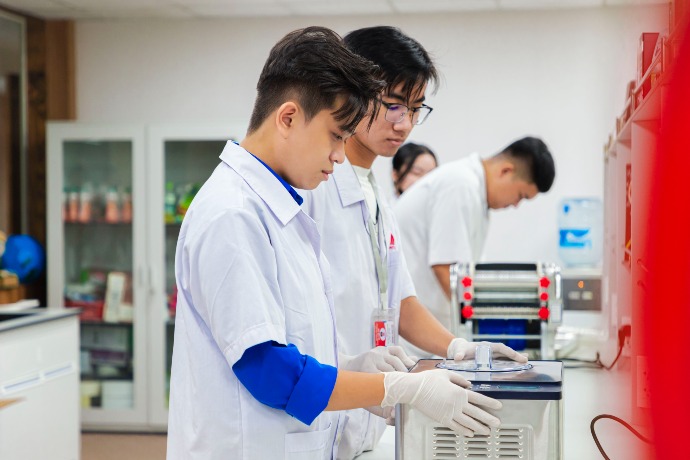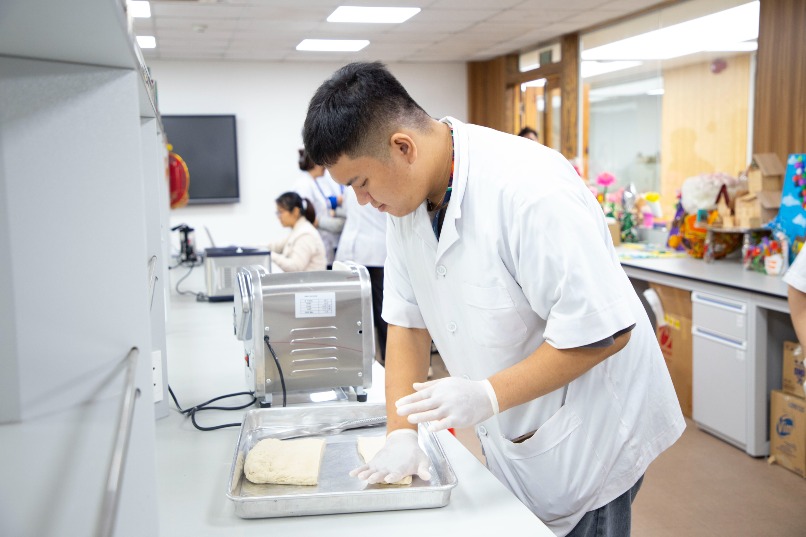Food Technology is a field of study in engineering and applied science in the production, processing and preservation of food products. This field provides students with knowledge and skills related to research, product development, quality control, preservation, management and evaluation of food products.
Major code
7540101
Enrollment combination
A00: Mathematics, Physics, Chemistry
A07: Mathematics, History, Geography
B00: Mathematics, Chemistry, Biology
B04: Mathematics, Biology, Civic Education
Academic years
4 yearsDegree
Engineer

Interactive and innovative learning activities are designed to promote critical thinking, creativity, and the development of effective and proactive lifelong learning skills.
Learner-centered approach, including lectures, practical exercises, site visits, internships, and real-world experiential learning.
Attendance evaluation, group project reports, individual essays, major assignments, laboratory practice, oral examinations, and graduation thesis or dissertation.

CB70303 - Public speaking skills (1 )
TP70005 - Introduction to the work of Food engineers (1)
TP71001 - New problems in the food technology industry (2 )
CB70301 - Key English 1 (3)
CB70302 - Key English 2 (3)
TA70303 - Key English 3 (3)
CB70304 - English Speaking Community (2)
CB70101 - Marxist-Leninist philosophy (3)
TA70305 - Intensive English 1 (4)
CB70304 - Emotion management skills (1)
CB70302 - Informatics 1 (2)
TM70005 - General biology (2)
MT70201 - Occupational Health (2)
HH70003 - General chemistry (2)
HH70004 - Practice General Chemistry (1)
CT70102 - Technical drawing (2)
MT70103 - Sustainable production and consumption (2)
CB70102 - Marxist-Leninist political economy (2)
CB70106 - General law (2)
TA70306 - Intensive English 2 (4)
CB70202 - Advanced math (3)
CB70305 - Communication and relationship building skills (2)
CB70303 - Informatics 2 (2)
CB71101 - Environment and sustainable development (2)
CB71102 - Behavioral psychology (2)
CB71103 - Psychology of Medical Ethics (2)
TP70001 - Food microbiology (2)
TP70002 - Practice food microbiology (2)
CB71401 - Physical education 1 - Swimming (1)
CB70103 - Science socialism (2)
TA70307 - Intensive English 3 (4)
CB70307 - Skills to prevent industrial accidents (2)
CB71104 - Green economy and sustainable development (2)
CB71105 - Vietnamese traditional culture and music (2)
CB71106 - History of world civilization (2)
HH70009 - Analytical chemistry (2)
HH70010 - Practicing analysis (2)
TP70003 - Biochemistry food (2)
TP70004 - Practice food biochemistry (2)
HH70013 - Mechanical processes and equipment (2)
TP70006 - Food law and policy (2)
CB71402 - Physical education 2 - Football (1)
CB70104 - Ho Chi Minh Thought (2)
CB70105 - History of the Communist Party of Vietnam (2)
TA70308 - Intensive English 4 (4)
QT71020 - Operational management (2)
MT71129 - Change management (2)
MT70110 - Recycled energy (2)
MT71130 - Circular economy and sustainable development (2)
MT71224 - Machinery and equipment safety engineering (2)
DD70040 - Practice first aid (2)
HH70014 - Heat transfer processes and equipment (2)
TP70008 - Food hygiene and safety (3)
TP70009 - Food Additives (3)
CB71407 - Physical education 3 - Basketball (1)
HH70015 - Mass process and equipment (2)
DD70014 - Nutrition and health (2)
TP70010 - Food analysis (2)
TP70011 - Analysis food practice (2)
TP70012 - Data processing and explain planning (2 )
TP70016 - Sweeteners and cane sugar technology (2 )
TP70017 - Refrigeration Technology (2 )
TP71006 - Technology for production and processing of vegetable oils (2)
TP71007 - Processing technology of tropical fruit products (2)
TP71009 - Canning technology (2)
TP71010 - Technology for processing food waste (2)
TP71011 - Tea, coffee and cocoa processing technology (2)
TP71012 - Food For Health and beauty (2)
TP71017 - Apply 5S and Kaizen in production (2)
TP71020 - Food packaging and labeling (2)
TP70018 - Professional practice (2)
CB70206 - scientific research methods (2)
TP70007 - Hazard analysis system and critical control points (2)
TP70013 - Developing food products (3)
TP70014 - Food sensory (3)
TP70015 - Processed animal meat, aquatic products (3)
TP71003 - Confectionery production technology (2)
TP71004 - Post-harvest technology of agricultural products (3)
TP71005 - Technology for producing alcohol, wine, beer and soft drinks (3)
TP71008 - Technology for processing milk and dairy products (2)
TP71013 - Food biotechnology (2)
TP71014 - Food Tester (3)
TP71015 - Quality Control (2)
TP71016 - Supply chain management and food traceability (2)
TP71018 - Food Defense and Food Fraud (2)
TP71019 - Code of practice for good agricultural production (2)
TP70019 - Graduation internship (8)
TP70020 - Engineering graduate thesis (10)
TP71021 - Topic 1 (3)
TP71022 - Topic 2 (3)
TP71023 - Project specialized in food technology (4)
Graduates can take on the following positions in the enterprise:
For over two decades, Dong Nai Technology University (DNTU) has grown and developed with the steadfast belief that "Talented and virtuous individuals are the vital essence of a nation.". Our mission is to educate high-quality human resources through technology-based training and experiential learning. We are dedicated to conducting applied research and transferring knowledge to meet societal needs, embrace international integration, and foster sustainable development. DNTU takes pride in cultivating digital citizens who are prepared to embrace the future with confidence.